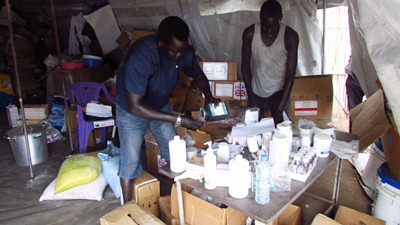FEATURE: Remote clinic saves hundreds in Jonglei’s isolated island
October 6, 2016 (BOR) – Civilians living in forgotten wetlands in Duk and Twic East counties of South Sudan’s Jonglei state have started accessing medical services, courtesy of John Dau Foundation (JDF).

James Thon Dau, a clinical officer at JDF, works with Ajang Deng Ajang, a nurse at the clinic located in a remote area.
Locals in the area say cholera kills many people in Ayod islands.
According to the Ajang, an outbreak of cholera last month killed over 48 people, with several other patients admitted at the clinic.
“On the 2 July, there was something like diarrhea, after three days, the cases reached 10. People thought that it was water poisoning that caused diarrhea, but when we investigated it clinically, we found it to be cholera”, the nurse told Sudan Tribune on Tuesday.
“People were scattered in different islands. Those who came here arrived when already dehydrated. Some passed away,” she added.
Machar Ajuong, a chief in Koiyom village, also confirmed the 48 deaths. Other patients, he said, died before reaching the clinic.
“We had a problem of where to bury the dead. I struggled with my community to lay our belief ones to rest”, said Ajuong.
Before December 2013 crisis, the population in the islands of Duk was about 8,650 people according to the chief. But these tremendously increased to over 16,000 during and after the crisis. Their islands are isolated from one another by swamps. No means of communications between them, and no boats to transport the sick people either.
“Koyoom is very remote and communication is a huge issue, so we cannot always get the health information out. The Duk Islands is a region comprised of 47 different islands over a distance of about 70 KM up the Nile. This is an expansive region and we are only able to reach a small portion of the islands with the resources currently available”, Dan Pisegna, JDF’s executive director told Sudan Tribune.
“Many of these people are IDPs who have fled to the islands to escape conflict. It is not easy to operate there, and additional resources are always needed, but JDF will always make every effort to assist. It is not just a matter of resources, it is a matter of committing to providing quality health care where it is needed most, and in the islands the need is huge”, he added.
JDF’s staffs at the Islands have no means of communicating to their officials in Bor, but Pisegna says the foundation has been trying to get a mobile internet for their staff there, yet they lack the resources.
Plans are underway to get a boat to transport people to the islands.
“Our biggest challenge in the islands is trying to reach all those in need of support. Resources are limited, and movement among the islands is difficult. But our new boat, which is soon to be launched, will help with this challenging issue. With the boat, we will be able to provide better healthcare to a larger population”, said Pisegna.
At times it’s very difficult to ferry patients to Bor civil hospital for surgery.
“We recently raised the money to purchase our own boat which we are calling our ‘Floating Clinic’ with the boat; we will be able to reach remote islands more easily. This will help us refer patients, and ensure essential medicines and drugs are reaching those in need”, the JDF executive director stressed during the interview.
To reduce the cholera infection, however, the staff of the foundation reportedly carried out hygiene and sanitation awareness, distributing tablets for treating the water, alongside other curative measures.
Several and malaria and abortion cases were also reported in Koyoom village and its neighboring islands by staff of JDF.
Last week alone, five cases of abortion were reportedly recorded at the clinic, which officials say resulted from malaria and infections among the expected mothers who never had medical access.
“Cases of abortion were many, due of lack of treatment and care. But when we came, the cases got reduced. Malaria was the major cause of abortion because they don’t have mosquito nets”, said Thon.
Up to 50 patients, on a daily basis, are being treatment at Koyoom from malaria from the start in June and July. Since then, malaria cases had reduced. In September, only 26 cases were registered.
The center has no testing facility for various diseases except malaria. Sometimes, some drugs for certain sickness are not available. The center also lacks a laboratory for testing suspected cases of diseases.
“We should be having a lab technician here with all the equipment. Now we have a test for malaria, but some diseases, have no tests. It is good to treat the patient after the test, that is when you can give right medicines”, said Thon.
The clinic, he further explained, has no ward, beds, or mattresses for admitting patients, even the cholera patients we sharing the same space with other patients and the community members.
(ST)
